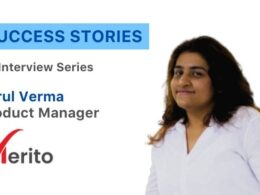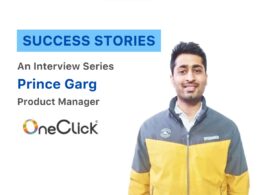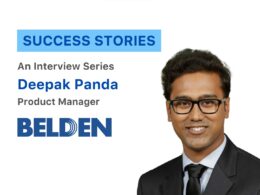Today in our Success Story blog, we introduce you to Abhilash Nandamuri who is a Product Manager and has been a part of GCPM, 2021. He shares his journey of achieving success and landing a career in the Product Management industry. Get to know more about him as he guides us through this amazing process.
Watch the video right here:
Q.1 Tell us about your current role and background.
This is Abhilash, I’m currently working as a product manager at an Ed-tech startup called Motion Education, it is a coaching class for competitive exams as well as foundation courses.
And right now, they are on the path of digitization and we’re building the platform for learning, for students across the board. I recently got into this formal product role, but I’ve had experience of building products for about three years before this.
Q.2 What challenges did you face while exploring a Product Management role?
I personally faced two challenges. One is from the employer side, like any and almost every role was being pushed across as product management and unless you actually had a conversation with them, you never really understood the essence of the role.
What I saw was even in product management jobs, employers used to have the same job description. So, you never really knew that you know, if you join XYZ company as a product manager, what it is that you will essentially be doing. So, that was one part.
So, it took a lot of filtering, like you know, a little bit of research on my own part before applying to that company. So, that was one and second when you do find jobs, which are good with good companies and good roles, because I was not coming from a proper product management role, that was a bit of a hindrance.
And on top of it, the MNC I used to work with was a B2B company, and whereas, I was applying to product management roles in B2C companies, so that was also a hindrance.
Q.3 How has Product Management helped you in your new role?
The most difficult thing with product management is that it’s not like a very defined role with clear boundaries. So, you know, you have to have knowledge and in some cases expertise across the spectrum, right from research, design, a bit of development, testing, and analytics.
So Product Management definitely helps with that. And before all this obviously, there is a lot of ideation, research and customer interviews that go into the process, before you actually start drawing up something on the whiteboard, that is primarily how product management has helped me.
I will say this is primarily because of communication, because in product management, you will be dealing with multiple stakeholders and you know, at different points in time, the dependencies will vary widely. So, communication needs to be very crisp and extremely clear.
That is one and also prioritizing your tasks, not only pertaining to a product, but in general how you prioritize your tasks. Those couple of things are what product management will teach you very well.
Q.4 What was the interview experience at your current company?
Yeah, so, I did attend a couple of interviews and essentially where it starts is, you know, why product management? So, I think that is one question where the employer is also trying to screen it out, you know, whether a candidate is really clear on his perspective or are they testing the waters because the market is hot or something like that.
That is how, why PM is how it started. And then suddenly, because I was in a stage where I was switching careers from a business/strategy/ finance, to a product management role, right.
So that was one key question that why do you want to change tracks at this point in time, when you’ve already done well over there. So, those are two questions that candidates need to be very clear about.
Then coming to the technicalities, you know, it was more about a case study, you know, one question was, if you want to improve, add a new feature to Spotify, what would that feature be? And what is the process you would go for?
So, this is more on the line of product sense and product thinking. Follow up questions were, What is your favorite product? Why is it your favorite product? And is there anything you would want to improve on in that product? Then there were a couple of design questions on knowing our knowledge about tools for wireframing, prototyping, mock ups, etc.
Then we jumped on in the day, we jumped on to the coding part, now, I’m not coming from a computer science or an electronics background, it was important to know, you know, how much of tech I really did understand.
And that is a like, broad level, you know, what our API is, what happens when you type a URL in a browser? How does IoT work eventually, etc. And then they were like behavioral questions. How do you handle pressure? How do you deal with conflicting opinions? And how do you manage deadlines, etc. that was spread across three interviews, but that is largely the substance of it.
Q.5 Why Accredian? How did it help you?
So Accredian, you know, they obviously now that a lot of options have sprung up for learning, whether it’s data science or business analytics or product management, but one thing I found very convincing with Accredian was, you know, people who will be teaching they will be the ones who are actually doing the job in like many big companies, and when I say very big companies, what I mean to say is, they’re handling very big and very complex products also.
So, that is one and second is the course is very well structured in terms of the no in terms of division. And in between there are assignments, as well as refreshers.
So, the structure and the time it gives to a learner, to learn it, think about it, and then use that experience in his daily life is something that’s important and recently we got done with the capstone project that was by far the most interesting thing and any other feedback is pretty good.
So, that is about it, I would say, if I were to summarize, why Accredian? One is structure, second is teacher, third is refreshers and assignments and fourth is quick feedback.
Q.6 What advice would you give to Product Management beginners?
So, in my previous role, where it was, it was related to business strategy and finance. So, there were several inefficiencies in terms of, you know, how data was being either handled or communication was being done over like major transactions.
So, when I saw that gap, right. So, we came up with this idea of developing an internal web portal with different modules, which will cater to different users. And it will make you know, it will make things easier, right from origination of financial transaction two, processing it, to verifying it to recording it for accounting purposes.
So this was a responsibility I took as an additional responsibility of my own, but it did not form part of the GED. So what I’m trying to say here is that people who are in their current roles, try to develop a product no matter how small it is, try to develop a product, which will either add some value to either internal customers or external customers.
So this will help you in upping your product sense, as well as going through the iterative process of design, development, testing, analytics, etc. And that is one, second is people who are just about to complete graduation or have become clear on pursuing product management as a career path.
I think there’s a lot of resources to go around, right, from very good books, to structured courses to some, like really neat blogs. And I think if they’re students, they also can look around, spot some problems, and can be like very local problems.
It doesn’t have to be global problems and build a solution for that, but it can be an application, can be a website or it can be both, and try to solve that problem. So again, this will help them with their product sense, and going through that iterative process of design to analytics.
So, I mean, there’s no there’s not much. I mean, honestly speaking, there’s not much substitute to having that real hands-on experience. So try to get that as much as possible, is what my advice would be.
Watch the interview right here:
We hope you found this success story interesting.





